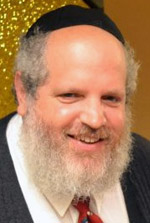
CARLSBAD, California — The story found within this portion is one of the most well-known of all Biblical stories. Even most schoolchildren know the story of the Flood of Noah. Nonetheless it is worthwhile to share a brief synopsis.
Adam and Eve, the ‘stars’ of last week’s portion were created in the ‘image’ of G-d, and were formed by G-d’s ‘hands.’ G-d ‘blew’ a living soul within them. They fulfilled the divine command to be fruitful, and they multiplied. As the generations progressed they grew farther away from the Creator. They no longer felt the closeness of their predecessors and made some horrifically bad decisions that led to horrendous consequences.
By the time ten generations had passed Noah lived in a world where people were constantly at each other’s throats. Raping, pillaging, murder were all abundantly prevalent. The profound immorality had even penetrated the animal kingdom, where there were ubiquitous instances of cross-species breeding, something which goes against nature itself.
Noah and his clan were different. The Torah attests that he was a Tzaddik / a saintly person in his generation. They stood on an island of virtue in a sea of depravity. The measure of sinfulness finally overflowed causing the Almighty to ‘regret’ the creation of humankind. Human beings were the choicest of all creations and they caused G-d to destroy that which He had made and to start over again.
A plan was devised for a new beginning. A flood would wash away the iniquity that had been building for ten generations. In order to weather the flood Noah was commanded to build an ark, a floating place of refuge, for his family and for the animals that deserved to be rescued. Noah started his monumental building project, but he took his time. He didn’t drag his heels out of reluctance for doing G-d’s bidding. He didn’t take his time because he was lazy, G-d forbid.
Noah took his time to give people the opportunity to see what he was doing, ask about it, and then to repent from their evil path.
It is hard to imagine the strength of Noah. His determination to remain loyal to G-d and His divine mandate in the face of all of humanity is truly daunting. He did not hide what he was doing. On the contrary, he openly told people about this project. Imagine what it is like to say to a neighbor, “You are evil and therefore G-d is going to destroy you and indeed, the entire world!” Some of us have difficulty telling someone that his zipper is open or there is a spot on his shirt.
The Rabbis ask an instructive question; since Noah was so righteous and courageous in his righteousness why was the flood named after him? It makes it sound as though he was responsible for it.
The answer that is offered is likewise instructive. During the many decades that Noah spent building the ark and telling people about why he was building the ark he failed to inspire even one person to change his ways.
Yes, Noah was righteous! Yes, Noah was incredibly brave! Yes, Noah was completely devoted to G-d! Unfortunately, Noah stopped there. Noah did not argue to save the people, as we will see concerning Abraham and later Moses. Noah failed to inspire people, which, we are told, indicates a lack of dedication to that particular task.
We are taught that words that come from the heart enter the heart. There was something lacking in Noah, great as he was, that caused his failure to inspire others. And because so much was riding on his abilities and efforts, his failure is highlighted for all of us to learn from.
We must reject the notion of spiritual selfishness (eg. I am doing what I am supposed to be doing and that is the extent of my responsibility.). We are indeed responsible for our fellow human beings. We must find the ways and means of inspiring the world to change course when we see it headed in the wrong direction. It is our destiny to serve as a “Light unto the Nations.” With that being said we must be sure to use the tools that Noah demonstrated. We must be resolute in our devotion to divine ethics and morals and we must be courageous in our pursuit of the G-dly mandate that we have been given!
Wishing everyone a happy and HEALTHY Shabbos!
*
Rabbi Yeruchem Eilfort is Director of Coastal Chabads and Chabad at La Costa. Rabbi Eilfort welcomes readers’ comments and questions and may be reached at RabbiE@ChabadatLaCosta.com.